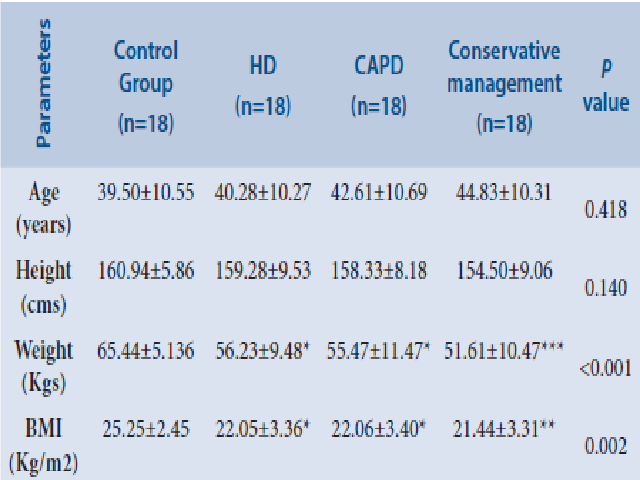Neurocognitive Assessment in Stage 5 Chronic Kidney Disease Patients on Various Treatment Modalities
Abstract
Background and Aim: The prevalence of Chronic Kidney Disease (CKD) is expected to rise among the various non-communicable diseases in India. CKD is associated with cognitive impairment. It requires one among the various treatments such as renal transplantation, Hemodialysis (HD) and Continuous Ambulatory Peritoneal Dialysis (CAPD). So cognitive deficit is known but the magnitude of improvement on different methods of treatment is not well established. Therefore, the present study is undertaken to determine the cognitive functions using MMSE score and paper and pencil neurocognitive test battery in stage 5 chronic kidney disease patients on various methods of treatment such as HD, CAPD and conservative management and compare it with controls. Methods: 54 medically stable stage 5 CKD patients (18 in each treatment group) and 18 healthy controls were recruited for the study. Mini Mental State Examination (MMSE) and Paper and pencil neurocognitive battery such as Trail making test A (TMT A), Trail Making Test B (TMT B), Letter Cancellation Test (LCT), Forward Digit Span (FDS) and Backward Digit Span (BDS) along with Body Mass Index (BMI) and biochemical parameters such as Urea, Creatinine, Glucose, Hemoglobin were noted from case sheets and eGFR calculated using CKD-EPI. Results: The mean MMSE scores, TMT A, TMT B, LCT, FDS and BDS were prolonged in all three treatment groups but found to be more prolonged in CKD patients on conservative management (p<0.001, p=0.008, p=0.039, p=0.059, p=0.135 and p=0.038) respectively. Conclusion: Cognitive functions are more affected in stage 5 CKD patients on conservative management compared to patients on dialysis.


This work is licensed under a Creative Commons Attribution-NonCommercial-NoDerivatives 4.0 International License.





